Commission, February 12, 2016, No M.7866
EUROPEAN COMMISSION
Judgment
ACTIVISION BLIZZARD / KING
Dear Sir/Madam,
Subject:Case M.7866 – Activision Blizzard / King
Commission decision pursuant to Article 6(1)(b) of Council Regulation No 139/20041 and Article 57 of the Agreement on the European Economic Area2
(1) On 8 January 2016, the European Commission received notification of a proposed concentration pursuant to Article 4 of the Merger Regulation by which Activision Blizzard Inc. ("Activision Blizzard" or the "Notifying Party", United States of America) acquires within the meaning of Article 3(1)(b) of the Merger Regulation sole control over King Digital Entertainment plc. ("King", Ireland) by way of purchase of shares (the “Transaction”).3 Activision Blizzard and King are designated hereinafter as the "Parties".
1.THE PARTIES
(2) Activision Blizzard is a public company, traded on NASDAQ, active in the development and publishing of interactive entertainment. Activision Blizzard develops and publishes games in most countries around the world, mainly for personal computers ("PCs") and consoles and to a limited extent for mobile devices.
(3) Activision Blizzard comprises three main operating units: Activision Publishing, Blizzard and Activision Distribution. Activision Publishing develops and publishes interactive software products and content mainly for Consoles. Blizzard also develops and publishes role-playing action and strategy games primarily for PCs, and to a limited extent for consoles and mobile platforms. Activision Distribution provides warehousing, logistical and sales distribution services to third-party publishers of interactive entertainment software.
(4) King is a mobile game developer, founded in 2002, whose games are available principally on tablets and smartphones using the major operation systems available on the market. Since the release of its first game in 2004, King has developed more than 200 games and offers them worldwide through dedicated websites, social networks (e.g., Facebook), and mobile distribution platforms. As of March 2014, King is listed on the New York Stock Exchange (the "NYSE"). King does not develop games for consoles.
2.THE OPERATION
(5) The Transaction involves the acquisition of sole control by Activision Blizzard over King.
(6) On 2 November 2016, the Parties announced to have reached an agreement by which Activision Blizzard, by means of an indirect subsidiary, acquires all of the shares of King and thus exercises sole control over King.
(7) Therefore, the Transaction constitutes a concentration within the meaning of Article 3(1)(b) of the Merger Regulation.
3. EU DIMENSION
(8) The undertakings concerned have a combined aggregate world-wide turnover of more than EUR 5 000 million4 (Activision Blizzard: EUR […]; King: EUR […]). Each of them has an EU-wide turnover in excess of EUR 250 million (Activision Blizzard: EUR […]; King: EUR […]), but they do not achieve more than two-thirds of their aggregate EU-wide turnover within one and the same Member State.
(9) The Transaction therefore has an EU dimension under Article 1(2) of the Merger Regulation.
4. RELEVANT MARKETS
(10) Activision Blizzard and King are both active in the publishing of game software. The Parties' activities overlap in the publishing of game software comprising games for PCs, consoles and mobile devices, and, in particular, in the publishing of games for mobile devices ("mobile game market") and its possible sub-segments.
1.1.The market for publishing of game software
1.1.1. Product market definition
1.1.1.1.The Notifying Party’s view
(11) The Notifying Party considers that, within the overall market for publishing of game software, a separate market exists for mobile games on the one hand, and for PC and console games on the other hand due to their different characteristics both from a demand and a supply side point of view.
(12) From a demand-side perspective, mobile games: (i) are offered for free or at a cheaper price (e.g. EUR 5-10) than PC/console games (e.g. EUR 50-70); (ii) offer higher flexibility to customers thanks to their "play on-the-go" ability; (iii) are technically less advanced with lower performance in terms of graphic, music and gaming options.
(13) From a supply-side perspective, the Notifying Party submits that PC/console and mobile games are distinct since the development of PC/console games require a considerably higher investment in terms of money, time and resources. In addition, PC/console games require a significant marketing campaign which is not required for mobile games.
(14) The Notifying Party further submits that games released for social networks, such as Facebook, or browsers should be part of the mobile game market and should be distinguished from PC/console games since they retain the main characteristics of mobile games (i.e., less expensive to develop, less sophisticated technical characteristics, etc.) with the only difference that they can be accessible via a browser.
(15) The Notifying Party submits that the mobile game market should not be further segmented according to different operating systems (i.e., Google Android, Apple iOS, etc.). First, in Facebook/WhatsApp5, the Commission acknowledged that communications apps available for different operating systems are normally regarded as a single product by users and providers. Second, the Notifying Party submits that King's mobile games for Google Play Store and Apple's App Store, which represent around [90-100]% of mobile games revenues, are identical.
(16) In relation to a possible segmentation according to different game genres (such as action, adventure, role-playing games, sport, strategy, resource management, etc.) the Notifying Party considers, in line with the Commission decision in Vivendi/Activision6 on the overall market for publishing of game software, that a segmentation of mobile games into specific genres would not properly reflect the dynamics of the industry. The Notifying Party suggests a delineation of the product market among casual, midcore and hardcore with increasing differences in terms of difficulty, strategic thinking and time commitment. The Table below provides a qualitative distinction between the three.
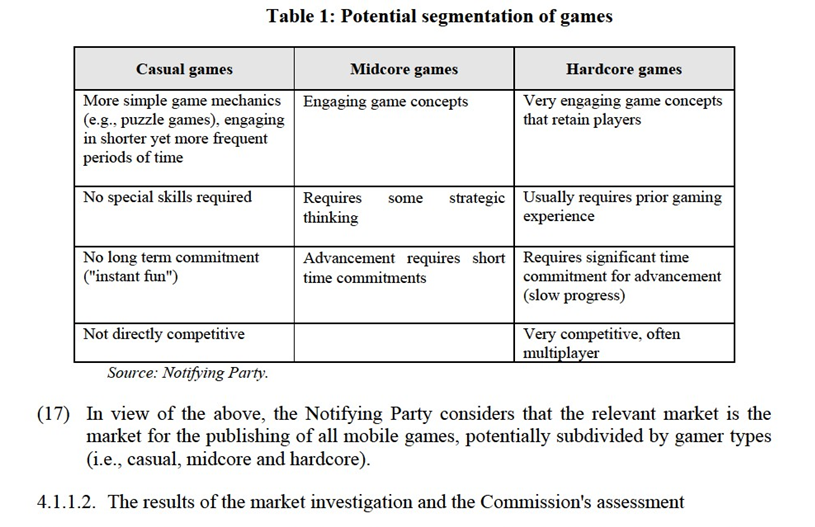
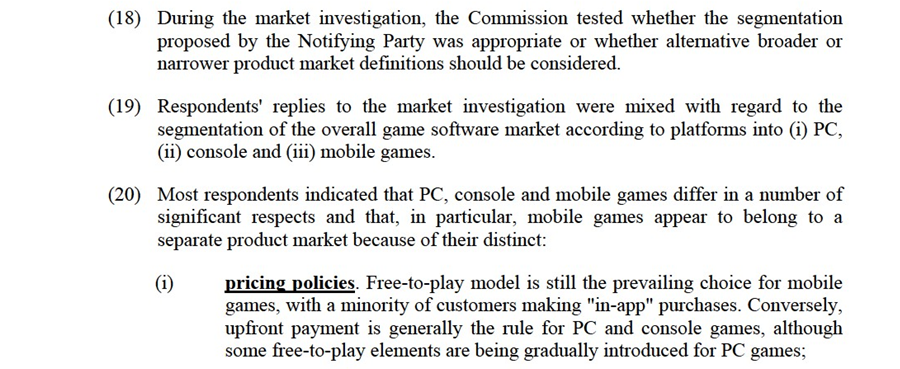
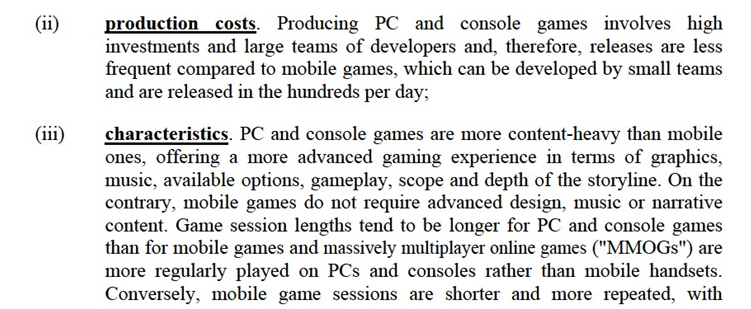
customers appreciating the possibility to play "on-to-go" (e.g., while travelling to work, on a train, etc.); (iv) distribution channels. While mobile games are distributed through application stores (such as Apple App Store and Google Play), the majority of sales of PC games are through digital download platform while console games are generally offered through traditional retail stores, dedicated websites or proprietary online platforms (e.g., PlayStation Network or Xbox Live).
(21) Moreover, console games tend to have features distinguishing them from PC ones. In particular, console games tend to be more expensive to develop, with generally higher retail prices. Furthermore, while PC games can potentially support a wide range of different hardware types and devices, console games have to comply with the strict criteria and development guidelines of console platforms, which approve developers before the release of games. Consoles are dedicated gaming devices and influence the consumers' choice of a specific platform, while PCs offer additional functionalities. In addition, console games appear to be sold mostly through traditional retail outlets and online retailers, while the majority of PC games is sold through digital download.7
(22) On the other hand, some respondents pointed out that the lines between different platforms are blurring, because games are often released on several platforms, there is substantial substitutability between games written for various platforms, and – despite the differences – customers see PCs, consoles or mobile just as alternative technological options, providing the same gaming experience. 8
(23) Moreover, the market investigation results indicated that social network games may belong to the same product market as mobile games since they have evolved in a similar way towards a more casual/interactive gaming experience and thus there is a high correlation in gameplay styles and types. However, according to certain respondents, browser games have (i) different distribution channels, since they are distributed via publishers' own websites or cooperation partner websites (such as Steam or GOG.com), not through application stores; (ii) higher session lengths; and (iii) different target groups and game experience, with multiplayer games being more common than on mobile devices. 9
(24) Furthermore, the majority of respondents does not believe that a segmentation according to the type of game or genre is necessarily warranted: from a supply-side perspective, the same company, or even the same team, can create all types of games; and from a demand-side point of view, such distinctions are not followed by customers and could not be accurately made.10 Similarly, respondents believe that the market should not be segmented according to the different type of game in casual, mid-core, hard core.11
(25) Finally, the market investigation results indicated that a subsegmentation within the mobile games segment according to operating system does not appear justified because companies generally develop games for all major operating systems (e.g. Apple App Store and Google Play) and, in any event, there are no meaningful differences between games played using different operating systems.12
4.1.1.3.Conclusion
(26) Based on the results of the market investigation, the Commission concludes that there are indications that the market for publishing of game software should be segmented according to the different platforms in: (i) PC games; (ii) console games; and (iii) mobile games. Moreover, the Commission believes that the market investigation results do not support a further segmentation of the mobile games market.
(27) In any event, for the purpose of this decision the precise product market definition can be left open, as the Transaction does not raise serious doubts as to its compatibility with the internal market in relation to the publishing of game software under any plausible product market definition.
4.1.2.Geographic market definition
4.1.2.1.The Notifying Party’s view
(28) In the present case, the Notifying Party submits that the relevant geographic market for publishing of mobile games is at least EEA-wide since: (i) there are no significant price differences between EEA Member States; (ii) the same publishers are active across the EEA; (iii) games are usually sourced on the same platforms across the EEA (e.g., Apple's App Store, Google Play Store); (iv) technical conditions related to broadband and mobile internet penetration have become largely similar across the EEA; and (v) language is not a constraint since mobile games are easy to understand due to their limited complexity.
4.1.2.2.The results of the market investigation and the Commission's assessment
(29) In Vivendi/Activision13, the Commission left open the question whether the geographic scope of the market for publishing of game software should be national or EEA-wide. In particular, there were a number of elements that pointed to national markets, such as national consumer preferences, and others indicating a geographic scope wider than national, such as the organization of the sales teams.
(30) In the present case, the vast majority of respondents to the market investigation believes that the geographic market for the publishing of game software (and all its sub-segments) should be at least EEA-wide, if not worldwide, due to generally uniform pricing, purchasing and game dynamics. In particular, one respondent highlighted how gaming became a worldwide industry with the advent of digital content distribution. However, some respondents pointed out that there are still differences in certain countries with respect to a number of aspects (e.g., pricing, business licences, taxes, age rating, import restrictions, and platform availability).14
4.1.2.3.Conclusion
(31) Based on the results of the market investigation, the Commission concludes that there are indications that the various possible segments for the market for publishing of mobile game software are likely to be at least EEA, if not worldwide in scope.
(32) However, the precise scope of the geographic market can be left open, as the Transaction does not raise serious doubts as to its compatibility with the internal market with regard to the market for publishing of game software and the potential narrower markets for PC, console and mobile games irrespective of the precise geographic market definition.
5.COMPETITIVE ASSESSMENT
(33) The Transaction would lead to an overlap between the Parties in the following potential markets: (i) the overall market for publishing of game software; (ii) the market for publishing of mobile games; (iii) the narrower potential market for publishing of mobile games according to different operating systems (i.e., Google Android, Apple iOS, etc.). However, the Transaction would only give rise to an affected market in relation to the potential mobile games market in the UK.
5.1.1.The Notifying Party's view
(34) The Notifying Party submits that the Parties' activities overlap in the market for publishing of games and some of its narrower segments. Their combined market share would be above [20-30]% only in the mobile games market segment in the UK. The Notifying Party further submits that no competition concerns of a horizontal nature can be expected to arise post-merger.
(35) The Notifying Party argues that both on the overall game software publishing market and on all narrower potential markets there is a large number of strong competitors. Following the Transaction, there would still remain a significant number of competitors in the market, leaving customers with ample opportunity to switch.
(36) The Parties further argue that the Transaction would not give rise to significant overlap since Activision Blizzard and King appeal to different categories of gamers. Activision Blizzard's most successful mobile games are midcore, whereas King's can be categorised as casual.
(37) Moreover, according to the Notifying Party, the mobile game market, irrespective of possible segmentation, has low barriers to entry and has seen a significant number of new entrants in the past years. Developing mobile games does not require significant
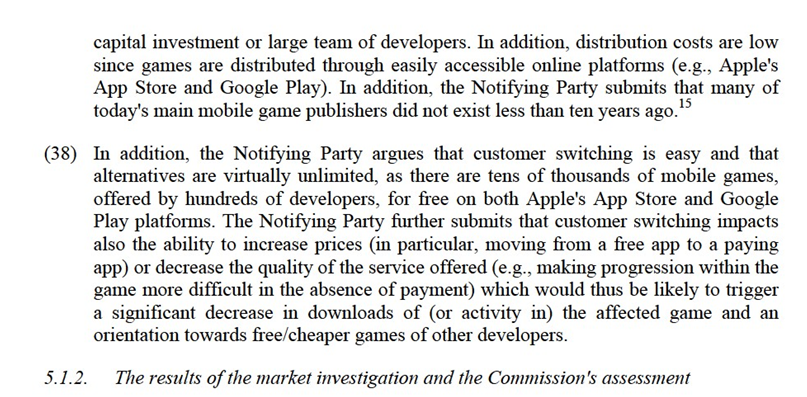
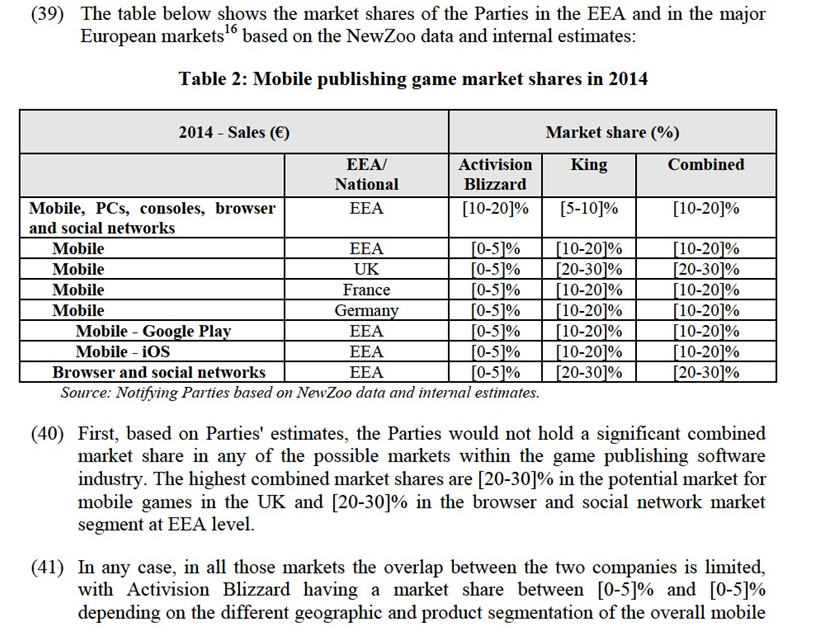
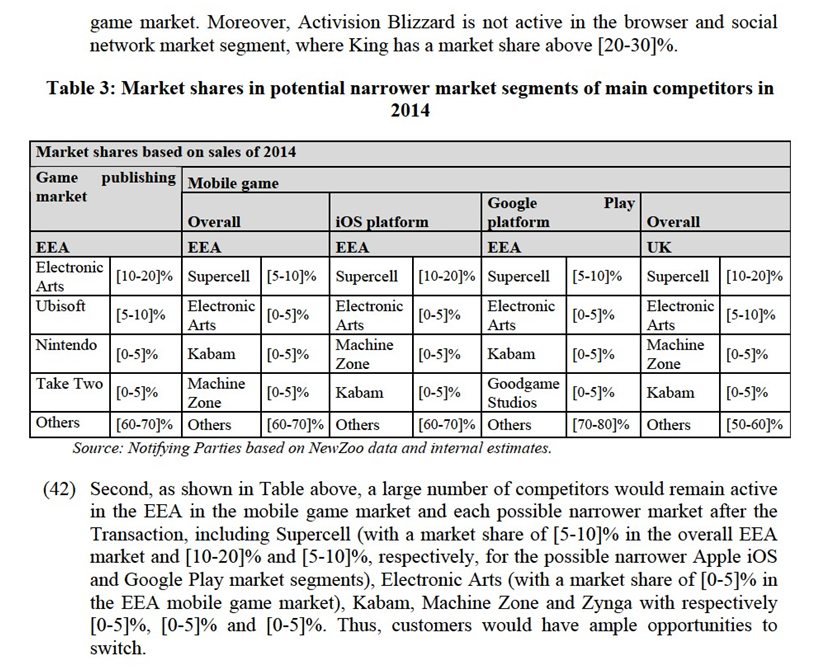
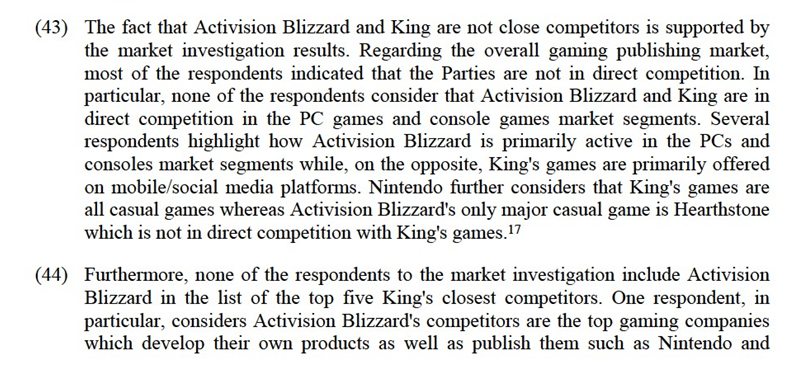
Electronic Arts, while King is a casual game developer and competes with other publishers in the specific market segment.18
(45) This finding is further confirmed by observing the top ten mobile game companies and mobile game apps in the Apple Store and Google Play platforms in the UK, the only market in the EEA where the two companies have market shares above [20- 30]%.
Table 4: Top ten companies as of November 2015 on iOS and Google Play combined by downloads and revenues in the UK
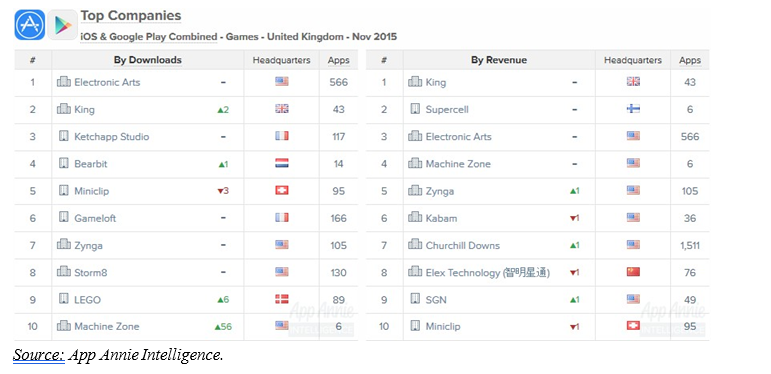
(46) As presented in the Table above, King is the second publisher by downloads and the first by revenue, but Activision Blizzard is not included in the list of top ten competitors in neither of the two rankings. In particular there are other competitors active in the market such as Electronic Arts and Churchill Dows which offer more than ten times the number of applications offered by King and, thus, exert a competitive constraint on King.
Table 5: Top ten apps as of November 2015 on iOS and Google Play combined by downloads and revenues in the UK
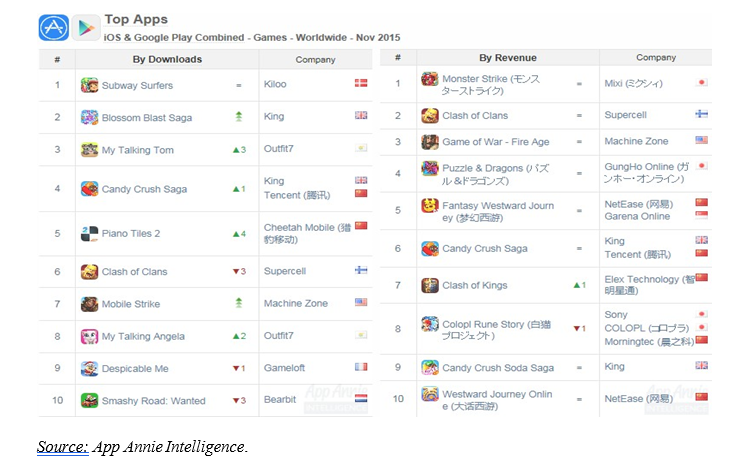
(47) The results are similar when observing the top ten apps by download and revenue. King has an important position having two apps in the top ten rankings, while none of Activision Blizzard's applications appears in the two rankings.
(48) Third, the mobile game market is characterized by low barriers to entry. Thousands of new mobile games are launched each year by a multitude of developers. Opposite to PCs and consoles games, developing mobile games does not necessarily require significant capital investment, large teams of developers or advanced technology. In addition, well established PC and console games developers showed interest in the mobile game market and recently announced their intention to enter in this space. In 2015 both Nintendo and Konami announced their plans to expand in the mobile game market.
(49) Respondents further consider that entry in the market for game publishing and its segments is easy both in term of time and costs to develop and launch a new game. One respondent also offering PC and console games, in particular, submits that entering the market can be done at low cost and with a short development time while distribution is easy thanks to online platforms such as Apple's App Store and Google Play. Another respondent further highlights that in the mobile game market, there are also examples of games written and published by a single individual that achieved worldwide success such as Minecraft and Flappy Bird. Ubisoft explained that market entry is easy but it also submitted that, in order to be successful, publishers need to obtain high visibility which requires certain marketing costs. The differences are even more significant when entry is compared with the PC and consoles market segments which is considered much more time-consuming and expensive by respondents to the market investigation.19
(50) Fourth, customer switching is very easy with thousands of games available for free on both Apple's App Store and Google Play platforms. Downloading a new game is easy and requires only few minutes and a few taps on a screen. Other than the potential cost of an Internet connection, there are no costs to the act of switching itself since there is no need to delete a previously downloaded game.
(51) The market investigation results indicated that switching between different mobile game publishers is particularly easy. Respondents indicated the following as the main reasons why customer switching is easy: (i) there are no entry barriers as most of the mobile games are free-to-play; (ii) all mobile games are accessible on platforms easily accessible (e.g. Apple's App Store, Google Play); (iii) there is an extensive mobile game offer; and (iv) there are no costs to switch to another game. In particular, respondents highlighted that customers purchase according to mobile game content and not on a publisher basis.20
(52) Finally, the market investigation results indicated that post-Transaction there would be a sufficient number of mobile game publishers able to compete with the merged entity. Since the barriers to entry are low and games can be distributed without major investments, a very significant number of mobile games will continue to be available on the market.21
(53) The majority of market respondents considers that the Transaction would not have any impact in the game software publishing market, in particular in the PC and console games market segments. Some respondents submitted that the Transaction may have a positive impact in the mobile game market segment by adding dynamism in that market segment.22 Respondents confirm that there will be no impact in relation to the competitive environment with a very large number of publishers capable of developing and marketing games whose success will depend on the quality of their games.
5.1.3.Conclusion
(54) The Commission concludes that the Transaction does not raise serious doubts as to its compatibility with the internal market on the market for the game software publishing and any potential narrower markets.
6.CONCLUSION
(55) For the above reasons, the Commission has decided not to oppose the notified operation and to declare it compatible with the internal market and with the EEA Agreement. This decision is adopted in application of Article 6(1)(b) of the Merger Regulation and Article 57 of the EEA Agreement.
1 OJ L 24, 29.1.2004, p. 1 ('the Merger Regulation'). With effect from 1 December 2009, the Treaty on the Functioning of the European Union ('TFEU') has introduced certain changes, such as the replacement of 'Community' by 'Union' and 'common market' by 'internal market'. The terminology of the TFEU will be used throughout this decision.
2 OJ L 1, 3.1.1994, p.3 ("the EEA Agreement").
3 Publication in the Official Journal of the European Union No C 12, 15.01.2016, p. 4.
4 Turnover calculated in accordance with Article 5 of the Merger Regulation.
5 Commission decision of 3 October 2014 in Case M.7217 – Facebook/WhatsApp.
6 Commission decision of 3 October 2014 in Case M.7217 – Facebook/WhatsApp.
7 See replies to Commission questionnaire to competitors and trade association Q1 of 8 January 2016, question 5.
8 See replies to Commission questionnaire to competitors and trade association Q1 of 8 January 2016, question 6.
9 See replies to Commission questionnaire to competitors and trade association Q1 of 8 January 2016, question 9.
10 See replies to Commission questionnaire to competitors and trade association Q1 of 8 January 2016, question 9.
11 See replies to Commission questionnaire to competitors and trade association Q1 of 8 January 2016, question 8.
12 See replies to Commission questionnaire to competitors and trade association Q1 of 8 January 2016, question 10.
13 Commission decision of 16 April 2008 in Case M.5008 – Vivendi/Activision.
14 See replies to Commission questionnaire to competitors and trade association Q1 of 8 January 2016, question 11.
15 Goodgames studios was founded in 2009 ; IGG.COM was founded in 2006 ; Kadam was founded in 2006 ; Nordeus was founded in 2009, upercell was founded in 2010 ; Zynga was founded in 2007.
16 Only market shares related to France, Germany and UK are presented since those are the major European markets […] of EEA revenues the two companies combined. In addition Activision Blizzard’s activity in the other Menber States is limited. For example, in the farth largest market by revenue (Italy), Activision Blizzard’s revenues were […] equal to EUR […] in 2014.
17 See replies to Commission questionnaire to competitors and trade association Q1 of January 2016, question 12.
18 See replies to Commission questionnaire to competitors and trade association Q1 of 8 January 2016, question 13.
19 See replies to Commission questionnaire to competitors and trade association Q1 of 8 January 2016, question 15.
20 See replies to Commission questionnaire to competitors and trade association Q1 of 8 January 2016, question 13.
21 See replies to Commission questionnaire to competitors and trade association Q1 of 8 January 2016, question 16.
22 See replies to Commission questionnaire to competitors and trade association Q1 of 8 January 2016, question 17.